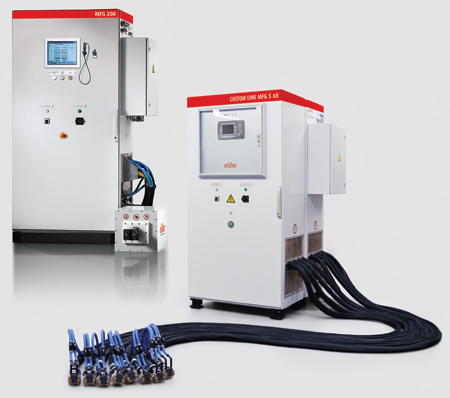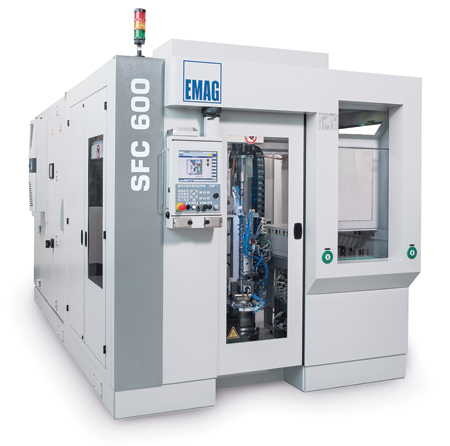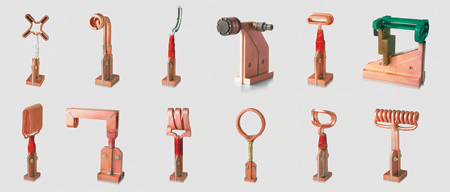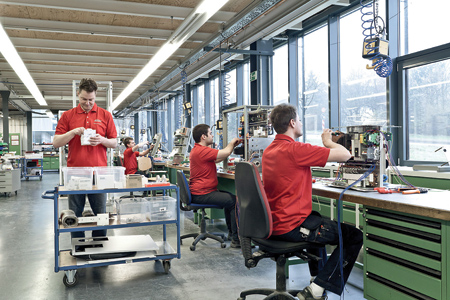
eldec CUSTOM LINE: the energy sources can be configured with single or multiple outputs and a variety of power and frequency combinations.



EMAG subsidiary eldec, based in Dornstetten, Germany, develops generators for induction heating processes, including many customized models in its CUSTOM LINE. "Induction heating is one technology that must be customized, because the quality of the procedure depends on a whole range of very specific details in the user's application," said a company spokesperson. The generator, being the energy source, plays an important role in this.
"eldec's approach is to engineer all the resonant-circuit components in conjunction with the control architecture to form a customized product, which provides induction heating with high efficiency, controlled application of energy and stable processes," said the spokesperson. "In order to make this process successful, close collaboration with the customer is required throughout the entire development process of the generator."
There are many possible application areas for induction hardening technologies. This technique is used in the manufacture of plant and machinery, in the automotive sector, in aerospace and in tool and die making. In the latter case, it is used to harden precisely those features of the tool or die that carry the greatest load later in the punching or embossing machine. Another typical area of application is the heating of components for a subsequent joining process.
The technology is also used in standardized applications like induction brazing and soldering, especially in the energy sector. "Its advantage here is precise targeting: the electromagnetic field applied can be adjusted perfectly to the workpiece in terms of its frequency, output and field characteristics, so only a very precisely defined area is actually heated. This precise application of energy also ensures speed, minimal workpiece distortion and economical energy consumption," said the spokesperson. "In many respects, however, the result depends on the technology used. Apart from the inductor, it is the generator that attracts the special attention of the developers. The induction specialists at eldec therefore offer customers not only the standardized models of the PICO, MICO and ECO series, but also the tailored products of the CUSTOM LINE."
Harry Krötz, head of Electrical Engineering R&D at eldec, said, "We always adjust the resonant circuit, the inverter and the inverter control to match the inductor, the required frequency and the output. We do that even with our more standardized series, with which we can currently cover about 80% of applications. With our CUSTOM LINE, however, virtually all the components can be configured in a fully variable way-from general device control to the outputs and interfaces."
Large Number of Possible Variations
"Just how far this approach goes can be seen by taking a look at the details of the configuration, such as the outputs, for example," said the spokesperson. "eldec engineers are not only able to equip their technology with single or multiple outputs, but they can also distribute the output of the generator however they wish. For example, it can be made available in parallel for independent control, or it can be supplied in an either/or arrangement so it is only available at one of the outputs at a time."
What are the advantages of multiple outputs for the user? "That depends on the heating task," Krötz explained. "For example, customers could use them to heat several locations on the part at the same time, speeding up the cycle time. They could also connect a variety of inductors to just one generator and operate them one after the other. This would allow them to reduce their purchasing costs for heating equipment if the cycle time was of secondary importance."
"At the same time, eldec is always able to modify the power and frequency features of its devices in virtually unlimited ways to adapt the process to the customer's needs," said the spokesperson. The scope ranges from medium-frequency generators with 20 to 1,500 kW power output and a frequency range from 8 to 40 kHz up to high-frequency generators with 20 to 1,500 kW output and frequency ranges from 80 to 400 kHz. A multitude of combinations are possible. It is ultimately the part or the contours that need to be heated that determine the final design. This may even entail values greater than or less than the values quoted above. "More and more often customers are asking for HF generators with very low frequencies, even below the 80 kHz mark," Krötz said. "Typically, we can even satisfy those requests. eldec also offers customized generators for outputs below 20 kW. For instance, we have built an MFG 5 with eight outputs several times for one customer. In fact, every second CUSTOM LINE generator constitutes a new system, one we have never before put together in that particular way. We have a lot of experience now in expanding our technology toolkit." The same also applies to the adjustment range, which refers to the ratio of the smallest inductor to the largest, or the range of frequencies that can be operated with a single generator.
Stable Processes Ensure Quality
To help ensure the quality and stability of the technology, eldec uses a high degree of vertical integration, more than 90% percent. All the central components are designed in Dornstetten and assembled by hand. In addition, the whole sequence, from first customer contact to delivery of the product, is clearly defined: in the first step, the technical sales staff clarify the heating task with the customer. Critical factors include, for example, how deep the heat needs to penetrate into the part and at what points. The results of this conversation affect the shape of the inductor and the configuration of the generator. In this exploratory phase it is also possible for preliminary testing to be performed at eldec, where there is a laboratory available with several generators for different frequency and output ranges. Once the heating task for the customer's part is defined, the technical sales staff holds a meeting with the development team to clarify technical details. This is when the initial design of the customer-specific generator is created, as the basis for a quotation. Once the quotation phase is completed, a handover meeting takes place between the development team and the production departments, who configure the technology on that basis-from the resonant circuit and generator control (including the interfaces to the customer's technology) through to the mechanical construction. The actual production phase takes approximately six weeks. Completion is followed by endurance testing with the original inductor at the frequencies requested. "In our testing we normally subject the device to significantly greater stress than would be the case in the customer's process later on, to ensure its process reliability. In certain situations, we may at this stage also make small modifications to the frequency or similar fine tuning. The sequence concludes with the acceptance, when the customer is presented with a solution that is precisely on target, effective and reliable," Krötz said.
For more information contact:
Kirk Stewart
Vice President of Sales
EMAG L.L.C.
38800 Grand River Ave.
Farmington Hills, MI 48335
248-996-4703
kstewart@emag.com
www.emag.com
SOUTHWEST
TX, LA
Eric Klenner
Regional Sales Manager
EMAG L.L.C.
248-595-1530
eklenner@emag.com
TX, OK, AR
Glenn Wise
Regional Sales Manager
EMAG L.L.C.
248-756-1641
gwise@emag.com
NM
Shane Cross
Regional Sales Manager
EMAG L.L.C.
248-207-5365
scross@emag.com
SOUTHEAST
MS
Eric Klenner
Regional Sales Manager
EMAG L.L.C.
248-595-1530
eklenner@emag.com
AL, GA, FL, NC, SC, E. TN, VA
Dave Fitzgerald
Regional Sales Manager
EMAG L.L.C.
248-595-1117
dfitzgerald@emag.com
W. TN
Mark Comeaux
Regional Sales Manager
EMAG L.L.C.
248-938-2097
mcomeaux@emag.com
NORTHEAST
W. PA, WV
Mark Comeaux
Regional Sales Manager
EMAG L.L.C.
248-938-2097
mcomeaux@emag.com
NY, PA, DE, MD, NJ, CT, RI, MA, VT, NH, ME
Kevin Gadde
EMAG L.L.C.
248-938-2430
kgadde@emag.com
Portions of NY and PA
Jeff Moore
Regional Sales Manager
EMAG L.L.C.
519-835-8425
jmoore@emag.com
MIDWEST
OH, KY, S. IN
Mark Comeaux
Regional Sales Manager
EMAG L.L.C.
248-938-2097
mcomeaux@emag.com
N. IN, W. MI
Peter Vandersluis
Regional Sales Manager
EMAG L.L.C.
616-307-7401
pvandersluis@emag.com
E. MI
Jeremy Elder
EMAG L.L.C.
248-962-8963
jelder@emag.com
ND, SD, NE, KS, MN, IA, MO
Bill Konetski
Regional Sales Manager
EMAG L.L.C.
612-804-0857
bkonetski@emag.com
IL, WI
Kirk Stewart
Vice President of Sales
EMAG L.L.C.
248-996-4703
kstewart@emag.com
WEST
WA, OR, CA, NV, ID,
MT, WY, UT, CO, AZ
Shane Cross, CMTSE
EMAG L.L.C.
248-207-5365
scross@emag.com